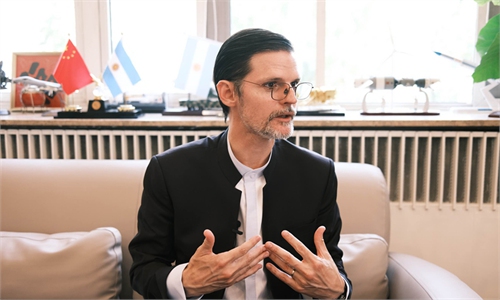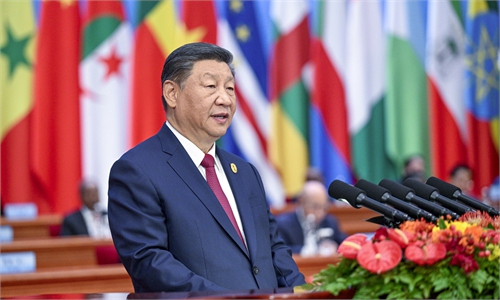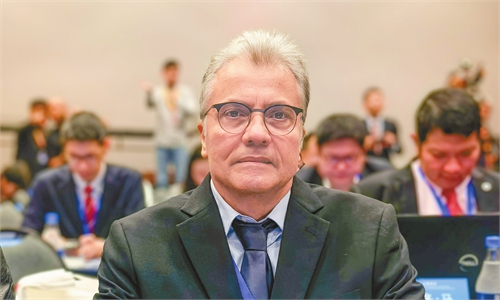IN-DEPTH / DIPLOMATIC CHANNEL
Relations with China, a trusted friend and development partner, have utmost significance in Nepal’s foreign policy: Ambassador

An aerial view of Kathmandu, Nepal Photo: VCG
Editor's Note:The year 2025 marks the 70th anniversary of the establishment of diplomatic relations between China and Nepal. As friendly neighbors and strategic cooperative partners, China and Nepal have witnessed growing cooperation across a range of fields and deepening ties over the years. In December 2024, China and Nepal signed a framework agreement to promote Belt and Road cooperation, demonstrating the strengthening mutual political trust between the two countries. However, this cooperation has, at times, fallen prey to false accusations by certain foreign media outlets. What role do relations with China play in Nepal's foreign policy? How does Nepal stand to benefit from cooperation with China? Global Times reporter Xie Wenting (GT) spoke with newly appointed Ambassador of Nepal to China Krishna Prasad Oli (Oli), who arrived in China on November 21, 2024, on these topics and more.
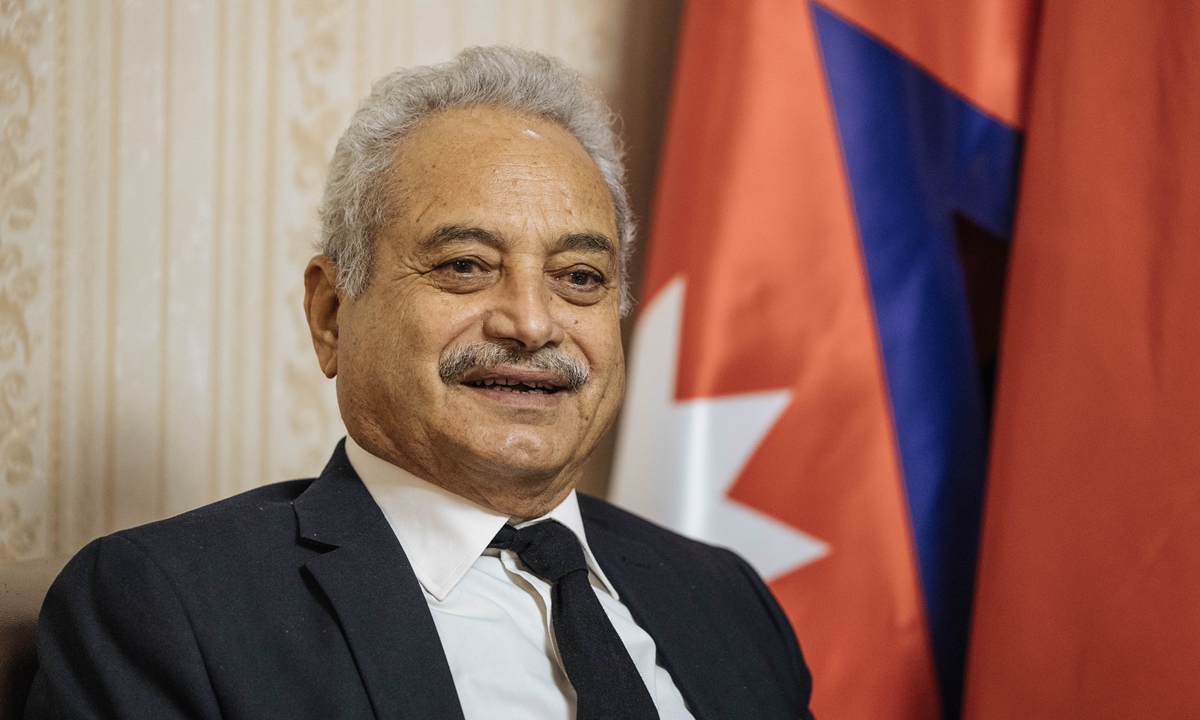
Ambassador of Nepal to China Krishna Prasad Oli Photo: Li Hao/GT
GT: Nepali Prime Minister K.P. Sharma Oli recently concluded his visit to China which attracted worldwide attention. How do you assess the outcomes of Prime Minister Oli's visit? How do you view the visit in terms of further promoting bilateral relations?Oli: Our Right Honorable Prime Minister recently concluded a four-day visit to China. The visit has been very successful and productive. The whole gamut of our bilateral relations was assessed. Deliberations on issues of mutual interest have produced excellent results.
The signing of the framework agreement to promote Belt and Road cooperation is the most important result of the four-day sojourn to Beijing. This framework ushers in a new era of Nepal-China practical cooperation. This framework also exhibits political understanding and goodwill among the highest leaders of both our countries.
This framework will help augment Nepal's development endeavors. Nepal needs to invest in infrastructure to realize the goals of sustainable socio-economic transformation.
Together with the framework, 10 other Memoranda of Understanding (MoUs) were signed, which are important in cooperation for the mutual benefit of the two countries.
I believe the visit has further elevated our ties. We have had several breakthroughs this time. Several projects under the Belt and Road Initiative (BRI) will help Nepal transform itself into a "landlinked" country from a landlocked country. We have also decided to make Bhairahawa and Pokhara international airports more operational by increasing the number of flights to those cities.
In summary, the visit has further consolidated the bilateral relations of our two countries.
GT: What role do relations with China play in Nepal's overall foreign policy?
Oli: Our foreign policy is guided by the principle of "Amity with all, enmity with none."
Our foreign policy attaches high significance to relations with our neighbors. We are situated between two giant neighbors that are growing at an excellent pace.
China is an economic powerhouse. We highly appreciate the achievements that China has made in a short span of time, especially the eradication of absolute poverty. We wish to learn from the miraculous development of China and embark on our own journey of socio-economic transformation.
On a political front, our friendship has always been free of trouble. Despite the difference in size and social systems, relations have always been exemplary. Hence, relations with a trusted friend and development partner like China are of significance in our foreign policy.
This year, we will be celebrating the 70th anniversary of Nepal-China diplomatic relations. To that end, both sides have jointly announced the year 2025 as "Nepal Visit Year," which will help further consolidate people-to-people ties.
GT: Nepal signed a framework agreement with China to promote BRI cooperation in December 2024. What does Nepal hope to accomplish under the framework? What are the priority projects for Nepal?
Oli: Seven years after signing the MoU on bilateral cooperation under the framework of the BRI, this new framework has ushered in a new era in enhanced Nepal-China "practical cooperation." Based on the MoU signed in 2017, this framework will be a guiding document for the implementation of projects initiated by Nepal and the funding modality will be discussed on a project-by-project basis.
With our political issues mostly settled, we are wholeheartedly focused on our journey of economic transformation. We want to focus on connectivity projects through this initiative. There are several projects enlisted under this framework.
The cross-border railway between Nepal and China under the purview of the Trans Himalaya Multi-Dimensional Connectivity Network is a dream project that will not only allow the flow of goods, but also people and services from both countries. Tunnel construction, the construction of special economic zones, hydropower, energy, and tourism, among others, are some important areas of cooperation. Collaboration in various fields will further grow and expand the age-old relations.
GT: How do you assess past cooperation between the two countries under the BRI?
Oli: Our MoU regarding the BRI was signed in 2017, and nine projects were mutually identified under this agreement. A year later, in 2018, under the purview of transnational and multidimensional connectivity networks, we decided to collaborate on roads, railways, ports, and aviation. In the contemporary world, transportation and communication are crucial aspects of human development. For this reason, we need various modes of transportation, including aviation, land transportation, and railways. Additionally, trade plays a vital role in this development.
Now that the framework agreement for cooperation under the BRI has been signed, we can expect to see tangible results in the near future.
In addition to the major infrastructure projects, there are several other initiatives that can help connect the hearts and minds of the people living in the border areas of China and Nepal.
GT: The signing of the agreement was claimed by some media outlets to have generated concerns regarding the so-called "debt trap." What's your response?
Oli: I think criticizing the BRI as a "debt trap" would be totally misguided. This visionary initiative the BRI has lived through 10 years with its more than 150 partners.
The initiative ensures investment in infrastructure, connectivity, energy, and more, all the way through East Asia, Central Asia, South Asia, and Europe. The BRI is a vision for common development, collective prosperity, and a shared future for humanity that is based on the principles of mutual cooperation, mutual benefit, and win-win cooperation.
For all the parties, I see a brighter future for cooperation under the BRI. In Nepal, the feasibility study of the cross-border railways is underway and is expected to be completed in 2026. After the feasibility study, the project shall be launched into implementation. Similarly, transmission grid lines also hold the key to our aspirations of further deepening connectivity.
I believe it is not a debt trap; rather, it is an initiative to promote the prosperity of humanity globally. As neighbors, we aim to advance our agenda of a happy Nepal, a prosperous Nepal, and happy Nepalis. This will contribute to achieving those goals.
GT: How does Nepal navigate its relationships with both China and India? How do you view the hype by some media outlets that the Nepali Prime Minister "broke from tradition" to visit China first?
Oli: It is only played out by some media outlets. We are a country between two giant neighbors. We attach special importance to our relationship with these neighbors.
Let me clarify that there was no such tradition and there is no breach of any tradition. We have enormous engagements with our neighbors. We have a lot of areas of cooperation with our friendly neighbors China and India. China is a trusted friend and a development partner. We have so many projects that need to be implemented. Therefore, the Right Honorable Prime Minister paid an official visit to decide upon the implementation of projects and explore other potential areas of cooperation as per our development requirements.
However, there seems to be some misunderstanding regarding the purpose of this visit. Some media sources are attempting to politicize the issue and create diplomatic tensions. This should not be a matter of contention. It is important not to use such subjects as political weapons. We maintain friendly relations with both of our neighbors, and this should not be a source of conflict.
Our focus should remain on fostering friendship and cooperation. Unfortunately, this narrative has been distorted by some media outlets. In my view, this is not an issue at all.
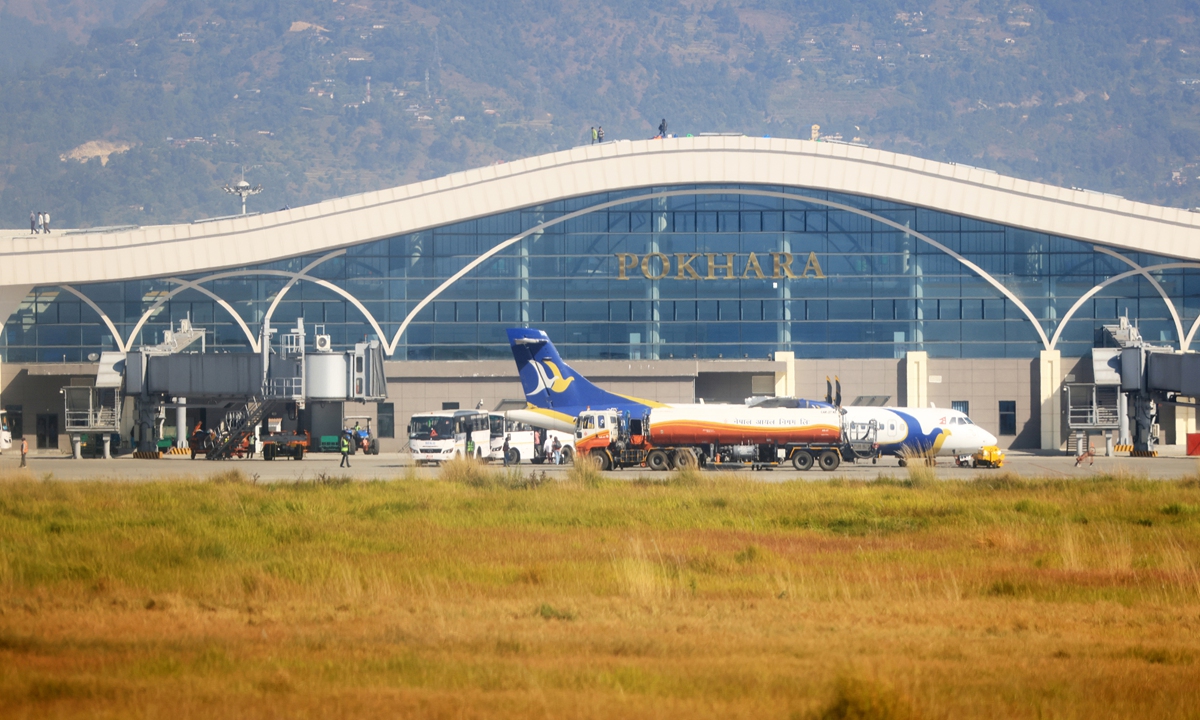
A plane lands at the Pokhara International Airport constructed by a Chinese company in Pokhara, Nepal. Photo: VCG
GT: What's your interpretation of the Global Development Initiative (GDI) and its significance to the world?Oli: The GDI is a landmark initiative that maintains "development as a priority." The GDI, I believe, is going to augment the realization of Sustainable Development Goals. It aims to create a "brighter future for mankind" and a "global development community." This initiative has provided a stronger voice to the Global South and provided a much-needed impetus to South-South cooperation.
The eight priority areas spelled out in the GDI reflect the magnanimity of the initiative. Areas like poverty alleviation, food security, and financing for development hold particular significance for the Global South. Besides, the initiative advocates sustainability and inclusivity. The development efforts pursued should be in "harmony with nature" to create a sustainable world and save this world for future generations. Nepal supported the initiative and the government of Nepal has decided to join the Group of Friends of the GDI.
GT: How do you assess the role of the Global Security Initiative (GSI)?
Oli: The GSI is promoting global peace. We need to examine a couple of key factors contributing to insecurity. There are several reasons for this insecurity, but two significant ones are poverty and poor communication. Poor communication affects various aspects, including infrastructure, transportation, and health-related issues. The GSI can effectively focus on resolving them. I believe that once these challenges are tackled, people will begin to live in harmony and peace.
The goal of the GSI is to create a more peaceful world by fostering a conducive environment. If implemented properly by each country, it can enhance the overall quality of life. A high quality of human life also means that human nature will be protected and conserved, leading to fewer problems, less conflict, and reduced poverty.
GT: Nepal has a rich history and beautiful landscapes. China proposed the Global Civilization Initiative (GCI), which advocates for respect for diverse cultures. What's your interpretation of the GCI?
Oli: The GCI respects the diversity of cultures and people-to-people exchanges. It respects the value of humanity.
Nepal is a country with a deep-rooted civilization, characterized by its many ethnic groups, diverse cultures, and various faiths. Therefore, the concept of mutual respect among people is crucial; it fosters an environment in which individuals can acknowledge each other's feelings and perspectives. This reciprocal respect enhances the overall value of humanity and upholds the dignity of every individual. Such principles are vital for promoting harmony and understanding in our interconnected world.
As a conservationist myself, I am hugely fascinated by the idea of "Eco-Civilization" where all civilizations live in harmony with nature. Balancing modernization endeavors and nature is a delicate task. It is a noble approach to put "green transformation" to centrality in all modernization efforts.
We need to learn from China, which is far ahead in the green economy. This is where all countries around the world need to pool their resources and effort to tackle all forms of pollution and promote green growth and fight the adverse effects of climate change.
